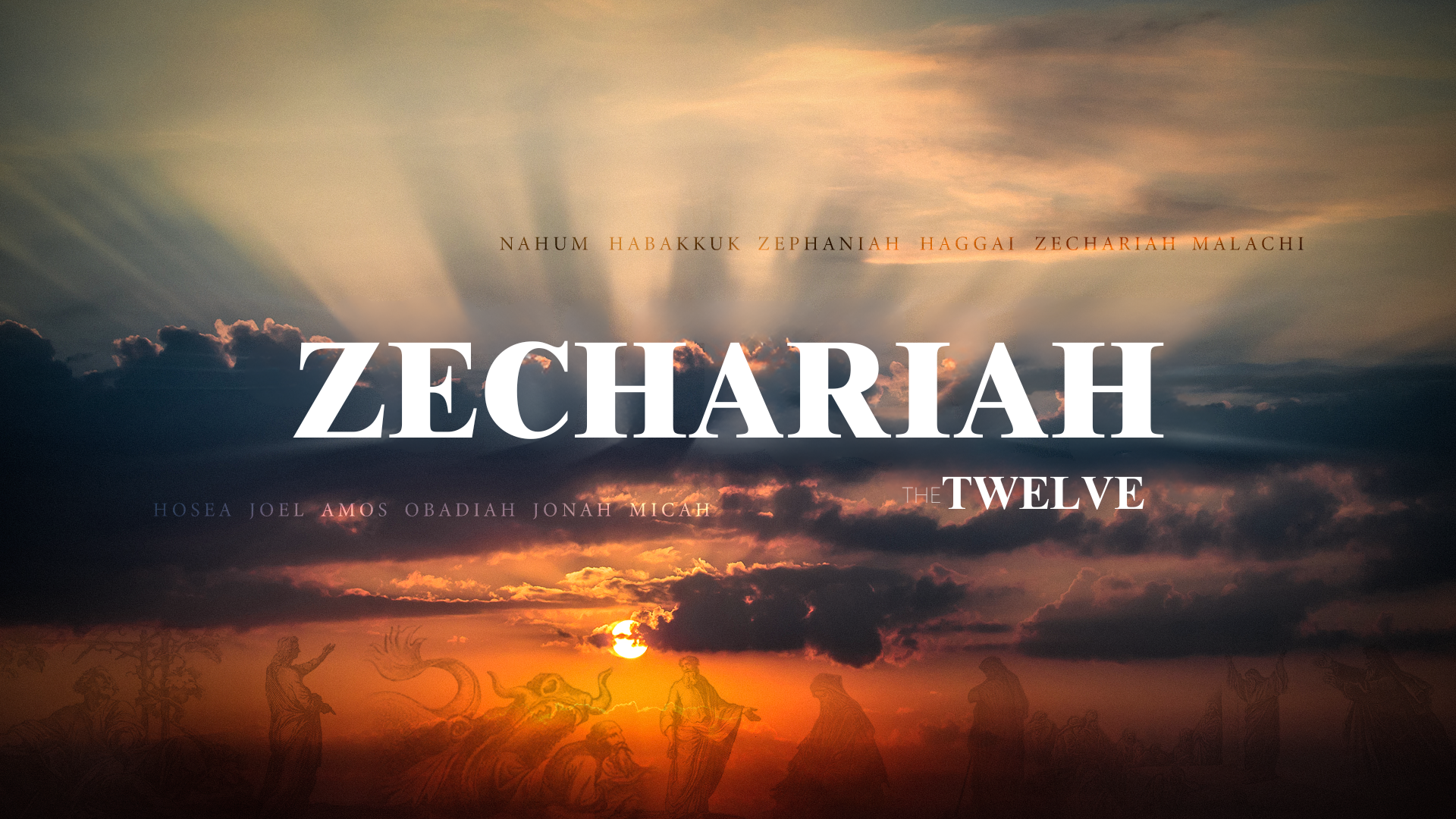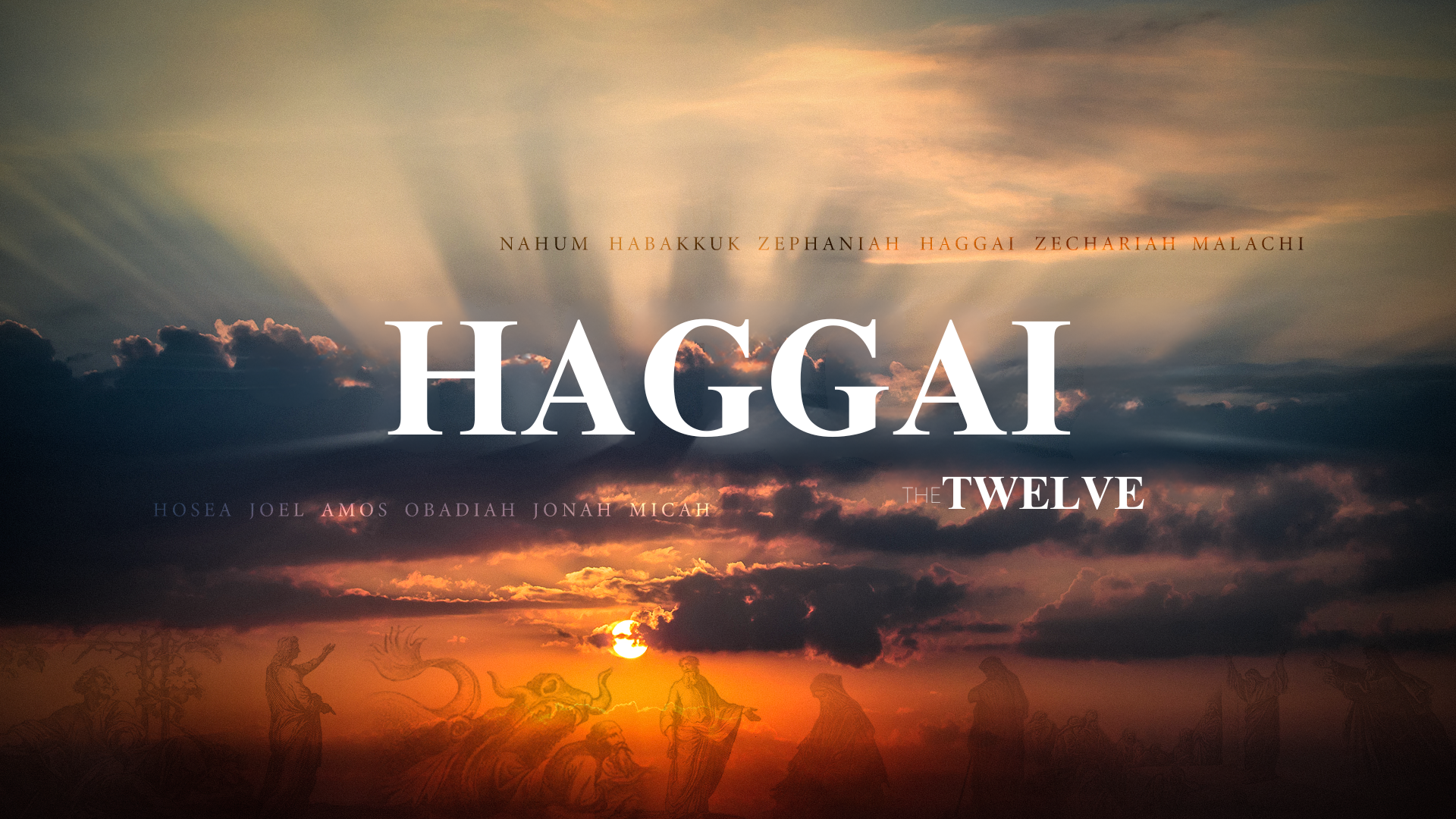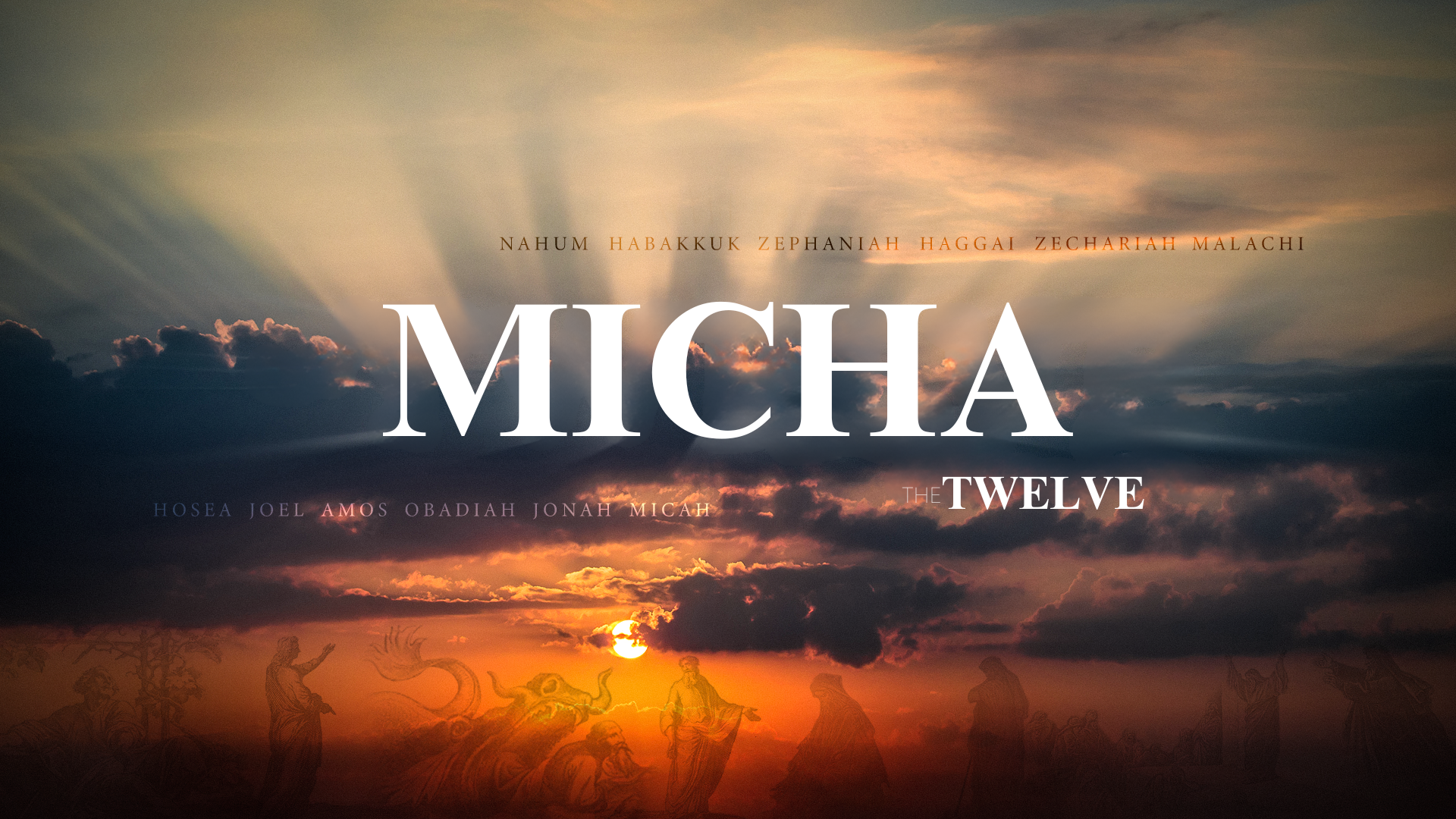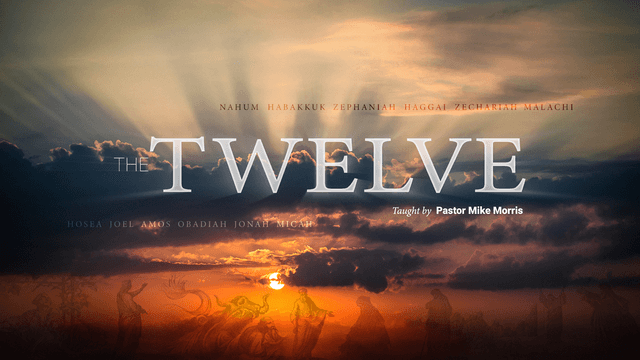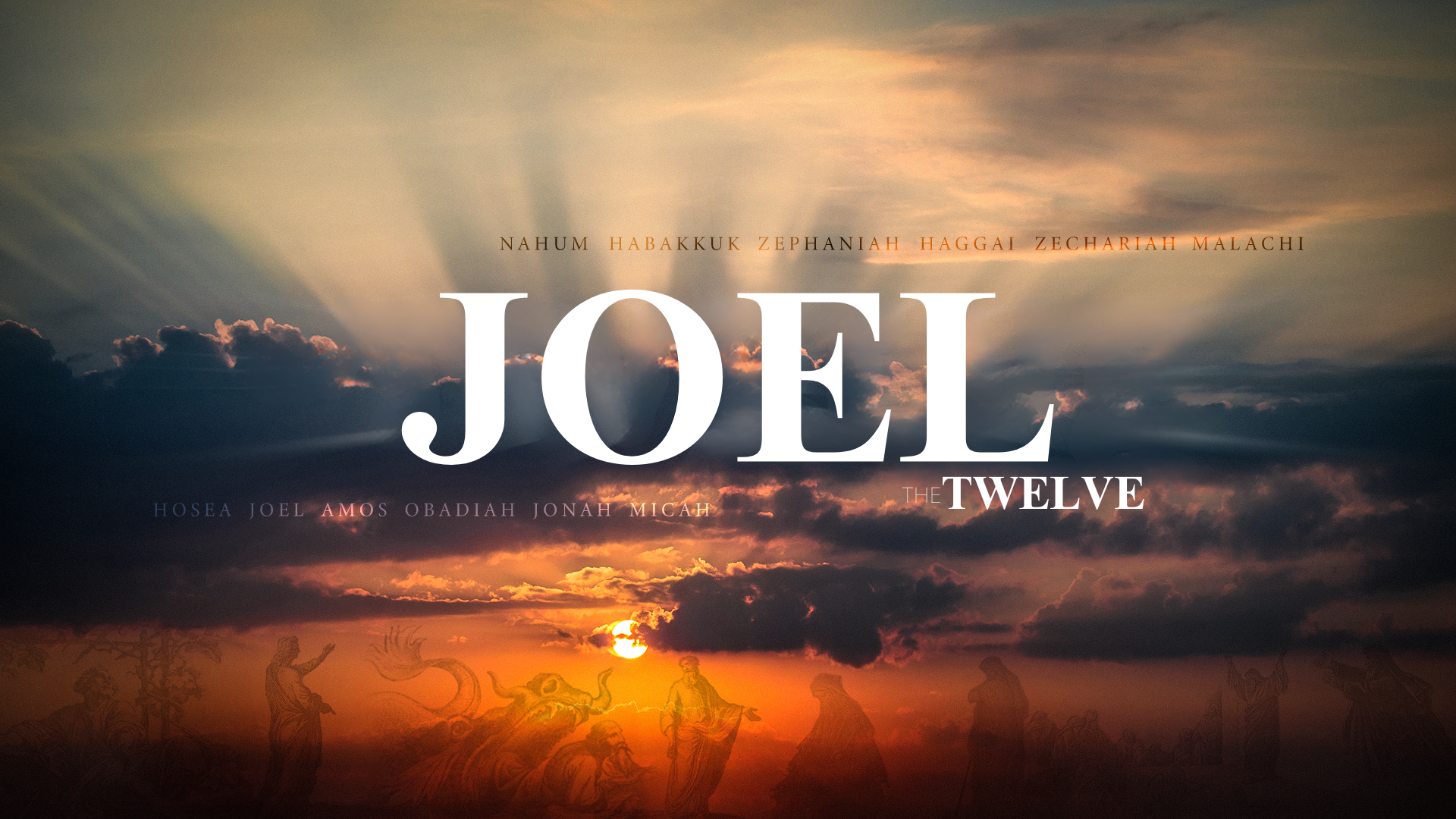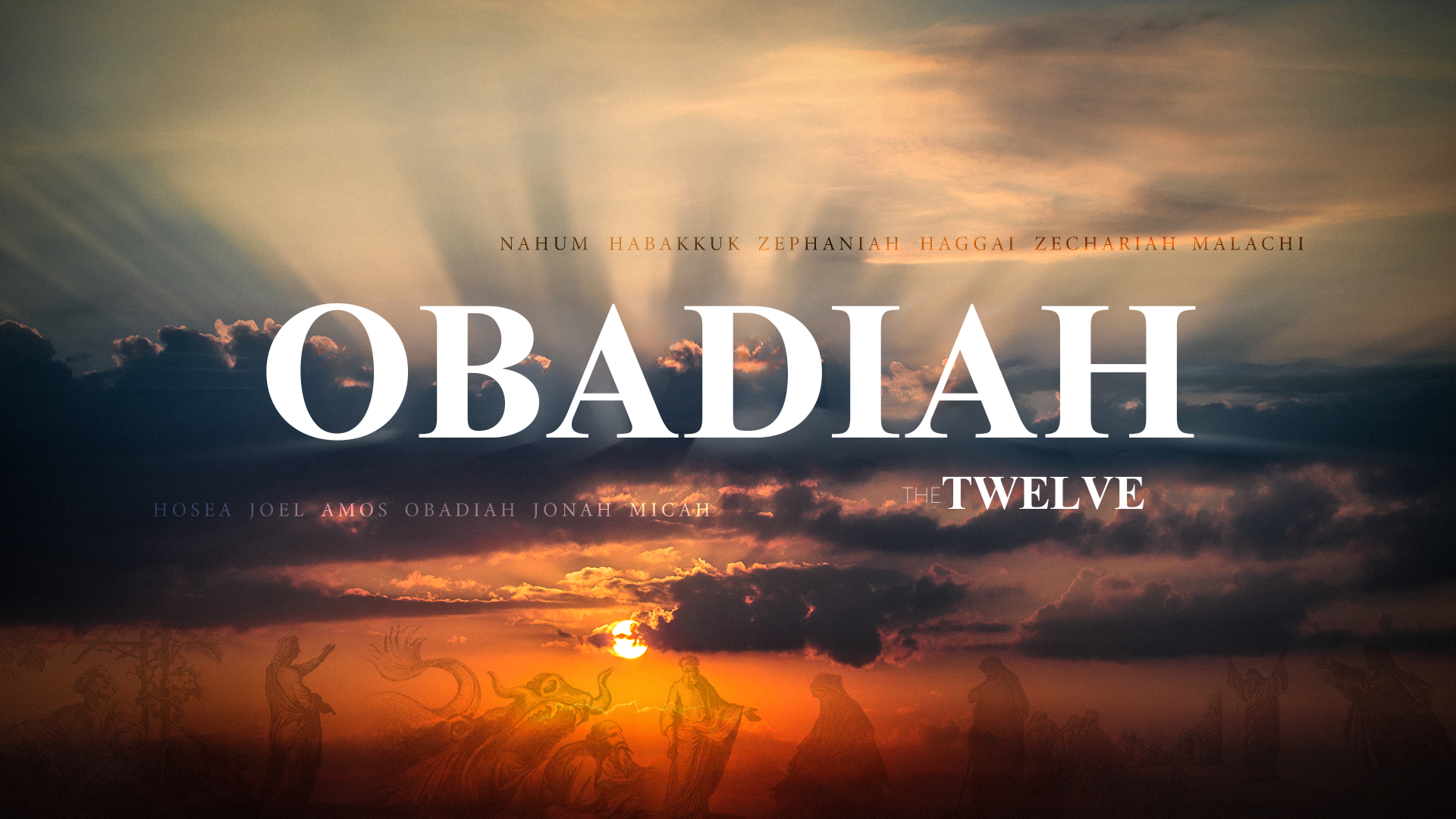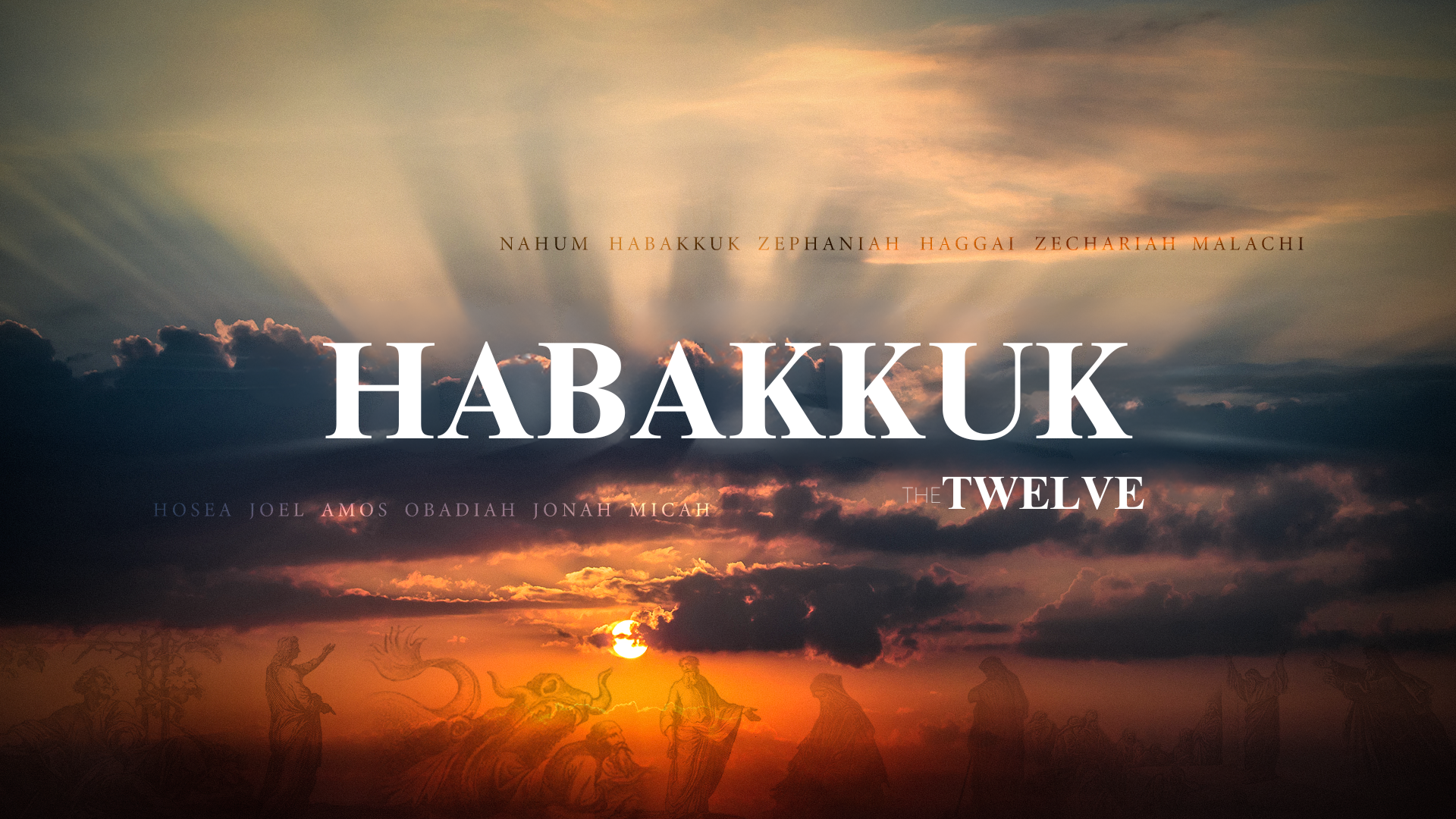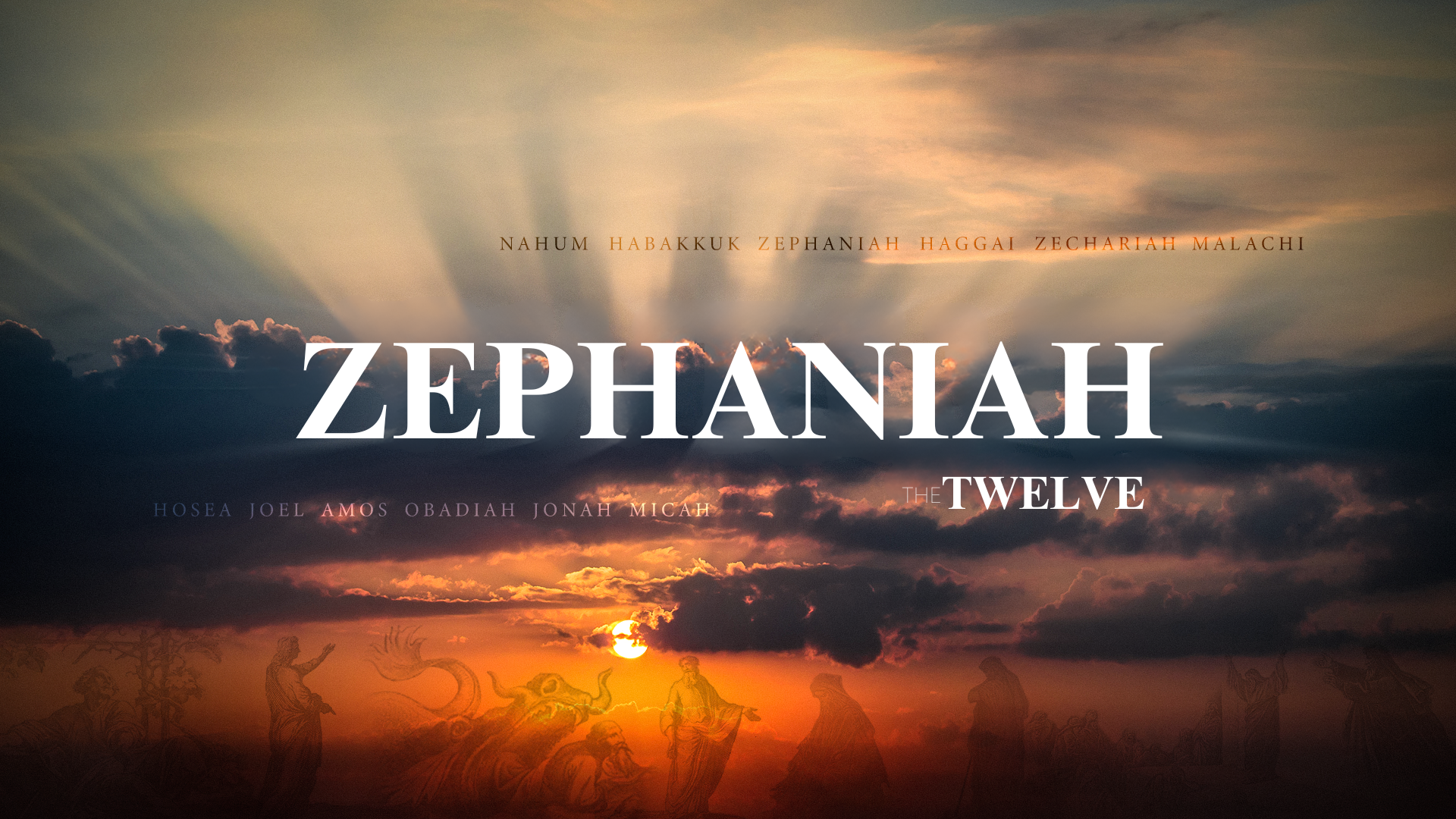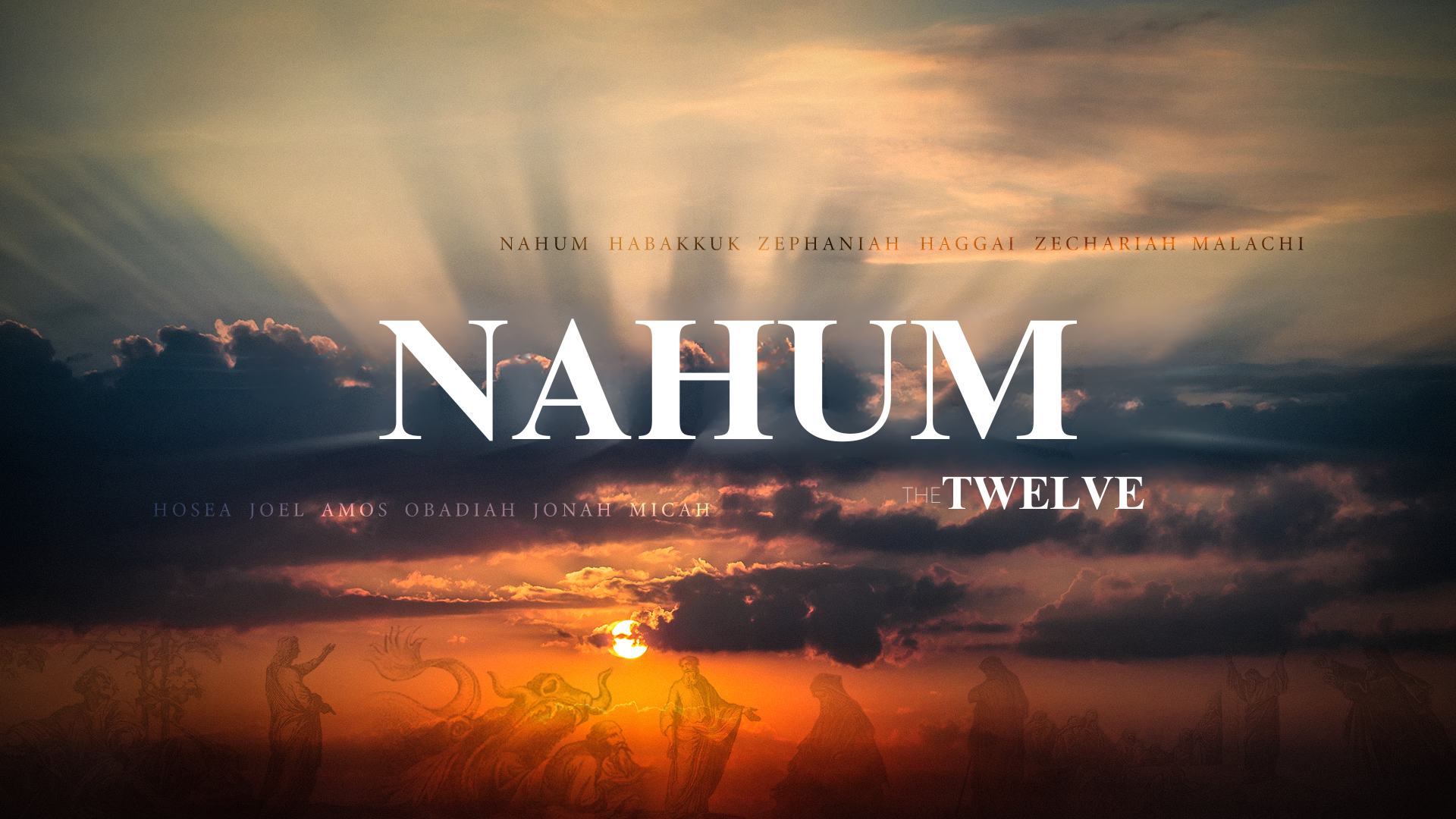MANUSCRIPT
Tonight, we continue our study of the book of Zechariah in the second part of chapter 5.
As we begin, let’s review.
Verses 1.1-6 affirm the importance of repentance to our relationship with God.
#1: The Angel of the Lord, the Messiah, intercedes for His people, and Yahweh pledges to remember and bless them.
#2: God promises to judge those nations He used to scatter Israel, because they furthered the disaster.
#3: God will yet glorify Jerusalem, and the Jews remaining in Babylon must flee to Judah.
The first three visions are related to the physical restoration of the nation.
Visions four and five address the spiritual restoration of the nation. In the fourth vision, Joshua the high priest, representing the nation of Israel, is forgiven and cleansed from sin, and the Lord promises to restore Israel to service as a kingdom of priests and a holy nation. And in the fifth vision, we saw the golden lampstand, representing primarily the Messiah, but also Israel and the church as the sources of God’s light in the world, powered by the Holy Spirit.
Last week, we examined the sixth vision, the flying scroll. We learned that God will ultimately judge not just nations, but individuals who reject the gospel of grace in Jesus Christ.
Tonight, we turn to the seventh vision. Let’s reflect back on the second vision, which assured Israel that while God used the Gentile world powers for His own purposes, to scatter Israel, He would also judge those powers for their unwarranted brutality in their actions toward Israel.
This seventh vision, the vision of the woman in the ephah, continues this theme of judgment, both in relation to the second vision as God assured Israel of His coming judgment of the Gentile world powers which had oppressed them, and the sixth vision, the vision of the flying scroll containing the Law, which brought judgment to sinners. Tonight I’ll share my best understanding arrived at through prayer and study. Let’s look at it together and continue to seek the Lord’s wisdom.
Let’s turn to Zechariah 5.5-11.
The Elements of the Vision
This is a complex vision with many elements. We begin with the interpreter angel.
5 Then the angel who talked with me came forward and said to me, “Lift your eyes and see what this is that is going out.” 6 And I said, “What is it?” He said, “This is the basket that is going out.” And he said, “This is their iniquity in all the land.”
This opening dialogue is consistent with other visions, as the angel tells Zechariah to lift his eyes. This time, he is directed to observe an object, but one that is in motion. He’s told to see what this is that is going out or going forth. This is the same phrase that was used of the scroll in the sixth vision, as the Law “goes out”.
The object he sees is a basket, but not just any basket. In Hebrew, it’s the word ‘ephah’ . An ephah was a standard measure for Israel and was used as a measure for offerings. Twenty times in the Torah, it’s used as a whole measure or divided into tenths for certain offerings.
In Judah, the ephah became a national symbol for commerce and trade. It is a dry measure generally used for grains like wheat or barley, equal to about 22 liters, or about six to ten gallons. A rough equivalent in our society would be a bushel. The liquid equivalent was the bath, which was equal to 22 liters. God demanded fairness and equity in these fundamental weights and measures in Jewish society, as we see in Ezekiel 45.10. 10 “You shall have just balances, a just ephah, and a just bath.
But over time, Jewish merchants began to cheat customers by using differing weights and measures, so they could tilt the scales, as it were, in their favor during transactions. That practice was prohibited by Deuteronomy 25.13-15. 13 “You shall not have in your bag two kinds of weights, a large and a small. 14 You shall not have in your house two kinds of measures, a large and a small. 15 A full and fair weight you shall have, a full and fair measure you shall have.
Even so, merchants and traders still cheated the people in unjust, deceitful trades, a practice condemned in Amos 8.4-6. 4 Hear this, you who trample on the needy and bring the poor of the land to an end, 5 saying, “When will the new moon be over, that we may sell grain? And the Sabbath, that we may offer wheat for sale, that we may make the ephah small and the shekel great and deal deceitfully with false balances, 6 that we may buy the poor for silver and the needy for a pair of sandals and sell the chaff of the wheat?”
By Zechariah’s day, the ephah had become not just a symbol of trade, but also of fraudulent and deceptive trade.
But this passage doesn’t just speak about an ephah. It speaks of an ephah “going out” or “going forth” as we read. 5 Then the angel who talked with me came forward and said to me, “Lift your eyes and see what this is that is going out.” 6 And I said, “What is it?” He said, “This is the basket that is going out.” And he said, “This is their iniquity in all the land.”
What does this dialogue represent? The ephah “going forth” indicates it is moving, leaving Jerusalem and Judah for another location. That’s what the Hebrew word ‘yo-se’ ‘yat-saa’ means. But importantly, the angel describes this ephah as “their iniquity in all the land”. Which begs the question: what is it about this ephah that warrants the label “their iniquity,” and why is it being removed from Judah to somewhere else?
I think this goes back to the connection of this unit of measure to commerce and trade, and especially deceptive trade. God sees this as a symbol of iniquity that has arisen within His people. Amos, which I quoted above, was a prophet to the northern kingdom of Israel, where the practice of making the ephah small and the shekel great, or merchants intentionally cheating others in trades, became common. It would be surprising if this practice had not also become common in Judah, too, and it certainly would have been known in Babylon. While idolatry is not seen again in Judah after the Babylonian exile, these sins of theft and swearing falsely by the name of Yahweh in business exchanges had evidently become very common throughout the nation, noted here and, as you’ll recall from last week on the flying scroll, those two sins represented the total sins of Judah.
So we see the ephah representing the beginnings of an iniquitous system that, while present in Judah, is not confined to Judah, but extends to all the nations of the world: an exaltation of materialism and avarice that has progressed from Zechariah’s day to our day, as the pursuit of wealth, and the power that wealth provides, overcomes all other human pursuits, including politics, religion, and culture, and eventually turns those other pursuits to serve the primary goals of greed and materialism. Students of the book of Revelation will recognize this as the nature of the final world order of the last days, as sin reaches its pinnacle in the reign of the antichrist. More on that in a moment.
We need to make one corrective here: money is not itself evil. as we know, money can be useful and productive for God’s kingdom, but the love of money is a serious sin issue, and it is said to be the root of all kinds of evil (I Timothy 6.10) . and when that love overtakes the love of God, of people, of righteousness, then humanity descends into all manner of transgression. This sin is not unique to any particular people, Jewish or Gentile. This sin seems to be universal and will become more so as time progresses.
But we shouldn’t overlook the foundational truth here. The continuing picture in this visionary cycles is one of the restoration and refining of God’s people through both judgment and forgiveness. We see it in the fourth vision, as God promised to remove the iniquity of this land in a single day, and the sixth vision, as God’s word written on the flying scroll is applied and the wicked are judged, and here in this seventh vision, as this “iniquity in all the land” is carried away.
Now in verses seven and eight, the vision continues with a sharper focus on the sins of greed and commercialism as the angel looks inside the ephah.
7 And behold, the leaden cover was lifted, and there was a woman sitting in the basket! 8 And he said, “This is Wickedness.” And he thrust her back into the basket, and thrust down the leaden weight on its opening.
It was common for ephahs to have lids or covers, but not ones made of lead. Here, another detail points us to greed and the misuse of wealth. Lead was commonly used as weights in commercial transactions. And dishonest merchants could cheat others by using false weights to their advantage in the exchange. Remember the divine mandate in Deuteronomy 25.15. 15 A full and fair weight you shall have, a full and fair measure you shall have.
So as the angel and Zechariah look into the basket as the lead cover is lifted, they see a woman inside the ephah. The angel’s condemnation is swift: he says, “This is Wickedness.” The Hebrew word, ‘ri-sah’, ‘ree-shah’, is a common word, and most often translated as ‘wickedness’ or ‘offense’ . The ephah and the lead, the measure and the weight of commerce, is clearly connected to, and occupied, if you will, by wickedness.
Much has been written about the fact that wickedness here is personified by a woman. I would point out that in Proverbs, wisdom is also personified by a woman. The Hebrew word for wickedness is in the feminine gender, which is consistent with the vision. Not all women are evil, any more than all men.
The verbs in these verses indicate there is some kind of struggle as the woman tries to escape the basket and the angel slams the lead cover back over her.
To summarize: here we find together the ephah, the national emblem of commerce and trade, especially deceitful trade–lead, a common material made into weights for use in commercial transactions -- and a woman, representing the personification of wickedness.
Now the vision continues.
9 Then I lifted my eyes and saw, and behold, two women coming forward! The wind was in their wings. They had wings like the wings of a stork, and they lifted up the basket between earth and heaven.
Zechariah now sees a new element of the vision. Two women with wings like the wings of storks are coming toward him and the angel.
A warning: throughout these visions, it is wise not to focus too much on the details, but to try to keep our attention on the overall message of the visions, individually and corporately. Here, as before, the details are not explained. And while much has been written about this verse, if we step back and look at what is happening in the context of God’s sovereignty, it seems clear that this is positive for Israel. Wickedness is being contained, and while it is closely associated with a wicked world order dominated by commercialism, at the same time, it’s being taken away. Removing wickedness from Israel seems unlikely to be the work of demons. Satan would doubtless want greed and commercialism to permeate God’s people. As we consider the winged women, the wind being in their wings probably just indicates strength and speed, though as we know, the word ‘ruah,’ “wind,” can also be translated “spirit”. A possible connection to God’s work.
It’s worth noting that they lifted up the ephah “between earth and heaven”. This same phrase is used in only two other OT references, 1 Chronicles 21 and Ezekiel 8. In both, the context is that of judgment, and it would seem the same here, as the woman in the ephah is judged and taken away.
Now to the closing verses.
10 Then I said to the angel who talked with me, “Where are they taking the basket?” 11 He said to me, “To the land of Shinar, to build a house for it. And when this is prepared, they will set the basket down there on its base.”
As Zechariah watches the two-winged women leave carrying the ephah, he asks the interpreter angel where they are taking the ephah. And this time, the angel gives a direct answer. “To the land of Shinar”. We learn about Shinar way back in Genesis 10 and 11. it was the land of the children of Ham, the son of Noah, and particularly the home of Nimrod. Genesis 10.10. 10 The beginning of his kingdom was Babel, Erech, Accad, and Calneh, in the land of Shinar.
In modern geographic terms, Shinar is in the land of Iraq, east of Israel and west of Iran, and it sits astride the two great rivers of Mesopotamia, the Tigris and the Euphrates, which are described as near the location of the Garden of Eden. Shinar also appears in Genesis 11.1-4. We learn of the beginning of the first organized rebellion against God. Now the whole earth had one language and the same words. 2 And as people migrated from the east, they found a plain in the land of Shinar and settled there. 3 And they said to one another, “Come, let us make bricks, and burn them thoroughly.” And they had brick for stone, and bitumen for mortar. 4 Then they said, “Come, let us build ourselves a city and a tower with its top in the heavens, and let us make a name for ourselves.
God’s judgment of the people building the Tower of Babel follows. Then in Daniel 1.1-2 we learn that Shinar was the seat of the Babylonian empire, particularly their religion. In the third year of the reign of Jehoiakim king of Judah, Nebuchadnezzar king of Babylon came to Jerusalem and besieged it. 2 And the Lord gave Jehoiakim king of Judah into his hand, with some of the vessels of the house of God. And he (Nebuchadnezzar) brought them to the land of Shinar, to the house of his god, and placed the vessels in the treasury of his god.
Now in Zechariah, we see the ephah containing wickedness, but also prophetically representing, I believe, the final world system of commerce and materialism, being taken from the land of Judah to the land of Shinar, to Babylon, the place of exile for God’s people.
Let’s look now at Revelation chapters 17 through 19 to connect this to the future. I encourage you to read all three chapters on your own. in 17.5-6, we see another woman. 5 And on her forehead was written a name of mystery: “Babylon the great, mother of prostitutes and of earth's abominations.” 6 And I saw the woman, drunk with the blood of the saints, the blood of the martyrs of Jesus. In chapter 18, we see the fall of Babylon, God’s name for the final world system. Revelation 18.2a. “Fallen, fallen is Babylon the great!.
What is remarkable in chapter 18 is that while we find significant mentions of apostate religion and political power, the dominant theme is greed-driven materialism. The “great ones of the earth” are not politicians or religious figures, but merchants. v 11. 11 And the merchants of the earth weep and mourn for her, since no one buys their cargo anymore. 15 The merchants of these wares, who gained wealth from her, will stand far off, in fear of her torment, weeping and mourning aloud, 16 “Alas, alas, for the great city that was clothed in fine linen, in purple and scarlet, adorned with gold, with jewels, and with pearls! 17 For in a single hour all this wealth has been laid waste.” And all shipmasters and seafaring men, sailors and all whose trade is on the sea, stood far off 18 and cried out as they saw the smoke of her burning, “What city was like the great city?” 19 And they threw dust on their heads as they wept and mourned, crying out, “Alas, alas, for the great city where all who had ships at sea grew rich by her wealth! For in a single hour she has been laid waste. v23b. for your merchants were the great ones of the earth, and all nations were deceived by your sorcery.
And don’t forget – even the mark of the beast in Revelation 13 is linked directly to economic activity. Without it, no one can buy or sell.
Back to Zechariah. Verses 10 and 11. 10 Then I said to the angel who talked with me, “Where are they taking the basket?” 11 He said to me, “To the land of Shinar, to build a house for it. And when this is prepared, they will set the basket down there on its base.”
Clearly, God is not benefiting wickedness, He is containing it. As we see in Revelation, there is a religious aspect to the world order, and “house” here is also used for a temple for a deity.
To conclude: God remains sovereign and has chosen this location to be the center of the final world system, the home of a global empire of commercial, materialistic wealth and enterprise, and the place of God’s judgment of Babylon the Great. Evil will be allowed to flourish for a season, but at the time and place of God’s choosing, the kingdom of Jesus the Messiah will begin, and He will reign forever and forever.
Summary and Application
Let’s review some truths and points of application from this vision.
God calls us to holiness. To be like Him, and unlike the world. We are to love others and seek to share the gospel with them, but never to adopt the values of the world. I Peter 1.14-16: 14 As obedient children, do not be conformed to the passions of your former ignorance, 15 but as he who called you is holy, you also be holy in all your conduct, 16 since it is written, “You shall be holy, for I am holy.”
Greed kills. Excessive desire for wealth is a spiritual problem. In Matthew 6.24, Jesus says, “you can’t love God and money”. The more you love and value money, the less you love and value God.
We can be spiritually healthy stewards of God’s resources by loving God most. God uses money and even blesses believers with money. There are Christians who have been given the spiritual gift of giving. The ability to earn, use, and give significant amounts of money without letting wealth come between them and God. In fact, they are able to make very effective use of wealth for the kingdom without spiritual risk to themselves. II Corinthians 9.7. God loves a cheerful giver. Why? Because it means a cheerful giver’s heart is just like God’s own heart.
Assess your attitude toward things: Luke 12.15. 15 And he said to them, “Take care, and be on your guard against all covetousness, for one's life does not consist in the abundance of his possessions.” Life is about adoration, not accumulation.
Beware of cultural influences designed to draw you into an unhealthy relationship with money and possessions. Any messages that tend to exalt greed, power, and excessive wealth should be avoided like a dangerous virus. That path leads to people’s natures in the last days: II Timothy 3.2: 2 For people will be lovers of self, lovers of money. lovers of pleasure rather than lovers of God.
Get and keep your priorities straight: Matthew 6.33. 33 But seek first the kingdom of God and his righteousness, and all these things (the physical needs of life) will be added to you.
Look for your treasure and you’ll find your heart. Matthew 6.19-21. 19 “Do not lay up for yourselves treasures on earth, where moth and rust destroy and where thieves break in and steal, 20 but lay up for yourselves treasures in heaven, where neither moth nor rust destroys and where thieves do not break in and steal. 21 For where your treasure is, there your heart will be also.
Be free: Hebrews 13.5: 5 Keep your life free from love of money, and be content with what you have, for he has said, “I will never leave you nor forsake you.” What a hopeful and confident close to the sermon tonight! Amen!!

Taught by Mike Morris
Associate Pastor of Verse By Verse Fellowship
The Twelve Series
